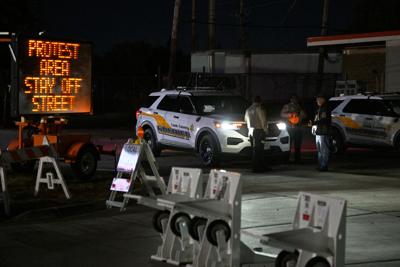For at least two weeks, National Guard troops won't be allowed to patrol the streets of Chicago after a judge blocked their deployment Thursday, citing no significant evidence of a “danger of rebellion.”
The decision in response to a lawsuit filed this week by Chicago and Illinois was a temporary win for the city and state's Democratic leaders. It comes as President Donald Trump works to move troops into major urban areas, arguing they have a rampant crime crisis, despite statistics not always backing that up. Troops were expected to start patrolling Friday in Tennessee, and a court battle continued over Trump's plans to deploy them in Portland, Oregon.
But what will happen to the hundreds of troops already in Illinois, including a small number outside a U.S. Immigration and Customs Enforcement building in Broadview, remained unclear.
Here's where things stand:
Illinois deployment blocked
In U.S. District Judge April Perry's ruling, she said the administration violated the 10th Amendment, which grants certain powers to states, and the 14th Amendment, which assures due process and equal protection.
The judge said the order would expire Oct. 23 at 11:59 p.m. She set an Oct. 22 hearing by telephone to determine if the order should be extended for another 14 days.
State and city leaders celebrated the decision, including Gov. JB Pritzker, who said: “The court confirmed what we all know: There is no credible evidence of a rebellion in the state of Illinois. And no place for the National Guard in the streets of American cities like Chicago."
Officials at U.S. Northern Command directed questions to the Department of Defense, which declined to comment citing a policy that the department doesn’t comment on ongoing litigation.
Hearing in packed courtroom
Perry heard arguments in a crowded downtown Chicago courtroom from attorneys for the state of Illinois and the Justice Department.
She pressed Justice Department lawyer Eric Hamilton on whether National Guard troops would only be stationed around federal buildings or also in neighborhoods, schools and hospitals. Hamilton responded that troops also could be used to “protect ICE agents” in the field.
Trump, meanwhile, has portrayed Chicago as a lawless “hellhole” of crime, though statistics show a significant recent drop in crime.
Chicago Mayor Brandon Johnson attended the hearing. He later told reporters that he would use every legal tool available to resist, whether that means turning to the courts or issuing executive orders.
Troops arrive in the Chicago area
Guard members from Texas and Illinois had arrived this week at a U.S. Army Reserve Center in Elwood, southwest of Chicago. All 500 are under the U.S. Northern Command and have been activated for 60 days.
A small number slept in vans Wednesday night outside the Broadview building and started patrolling the next morning behind portable fences. There have been occasional clashes between protesters and federal agents at the ICE site over the last several weeks.
Trump claims troops are needed to protect federal immigration enforcement efforts and crack down on crime.
Since the start of his second term, the Republican president has sent or discussed sending troops to 10 cities, including Portland, Oregon; Baltimore; Memphis, Tennessee; the District of Columbia; New Orleans; and the California cities of Oakland, San Francisco and Los Angeles.
Judge restricts federal agents' use of force
Federal agents have been ordered — temporarily — by another federal judge to wear badges and are banned from using certain riot control weapons against peaceful protesters and journalists outside an Chicago-area ICE facility.
A preliminary injunction issued Thursday by U.S. District Judge Sara Ellis restricts agents’ use of force, including pepper balls, rubber bullets and physical force such as pulling, shoving or tackling against protesters and journalists who don’t pose a serious threat to law enforcement.
Ellis’ order covers all of northern Illinois and also requires federal agents to wear “visible identification” such as badges, the subject of heated debate as viral footage has surfaced of masked, plainclothes officers carrying out immigration enforcements in several U.S. cities.
Filed by a coalition of news outlets, media associations and protesters — including the Illinois Press Association, Block Club Chicago and the Chicago Headline Club — the lawsuit accuses U.S. Immigration and Customs Enforcement, the Department of Homeland Security and Border Patrol of unleashing a campaign of violence and intimidation against peaceful protesters and journalists during weeks of protests outside an ICE detention facility in Broadview, Illinois, about 12 miles (19 kilometers) west of Chicago.
Pope Leo speaks on behalf of immigrants, minorities
Pope Leo XIV urged labor union leaders visiting Rome from Chicago on Thursday to advocate for immigrants and welcome minorities into their ranks. Leo said that “while recognizing that appropriate policies are necessary to keep communities safe, I encourage you to continue to advocate for society to respect the human dignity of the most vulnerable.”
The audience was scheduled before Wednesday’s deployment of National Guard troops in the Chicago area. The pope is a native of Chicago.
Associated Press reporters across the U.S. contributed, including Claire Rush in Portland, Oregon; Rebecca Boone in Boise, Idaho; Sophia Tareen in Chicago; Jack Brook in New Orleans; Christopher Weber in Los Angeles; and Josh Boak and Konstantin Toropin in Washington.











